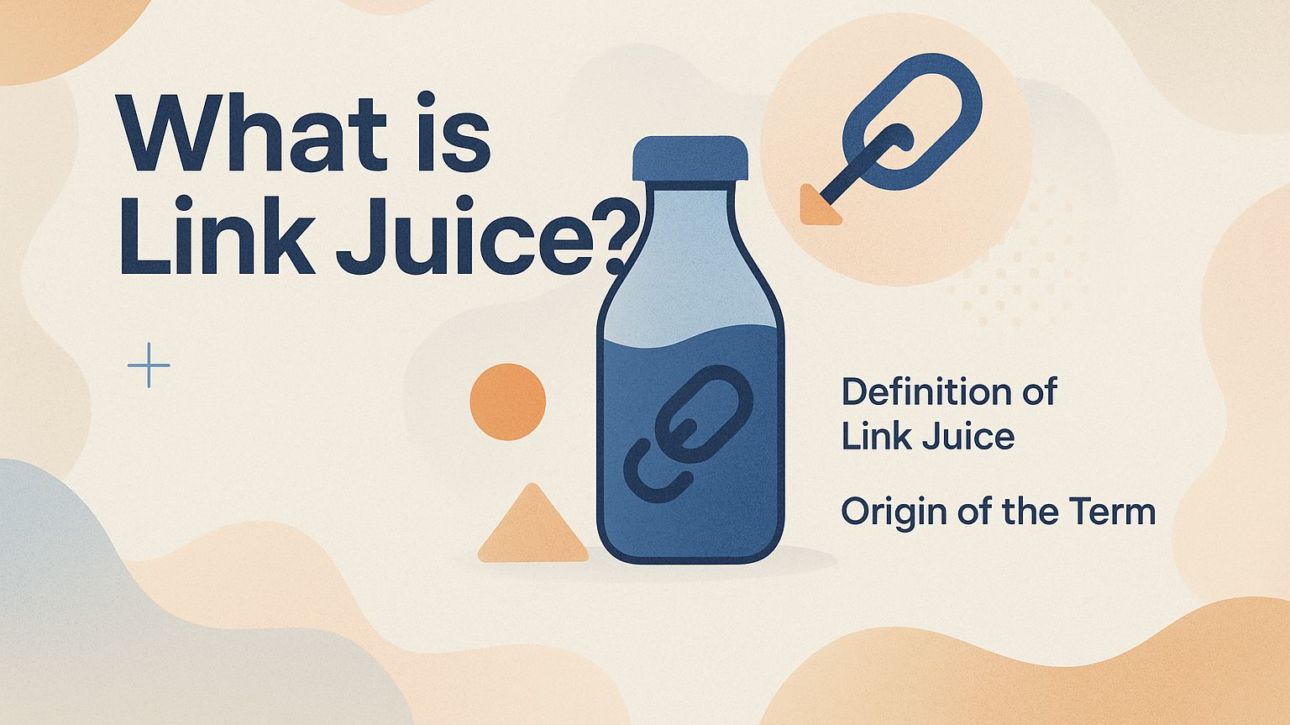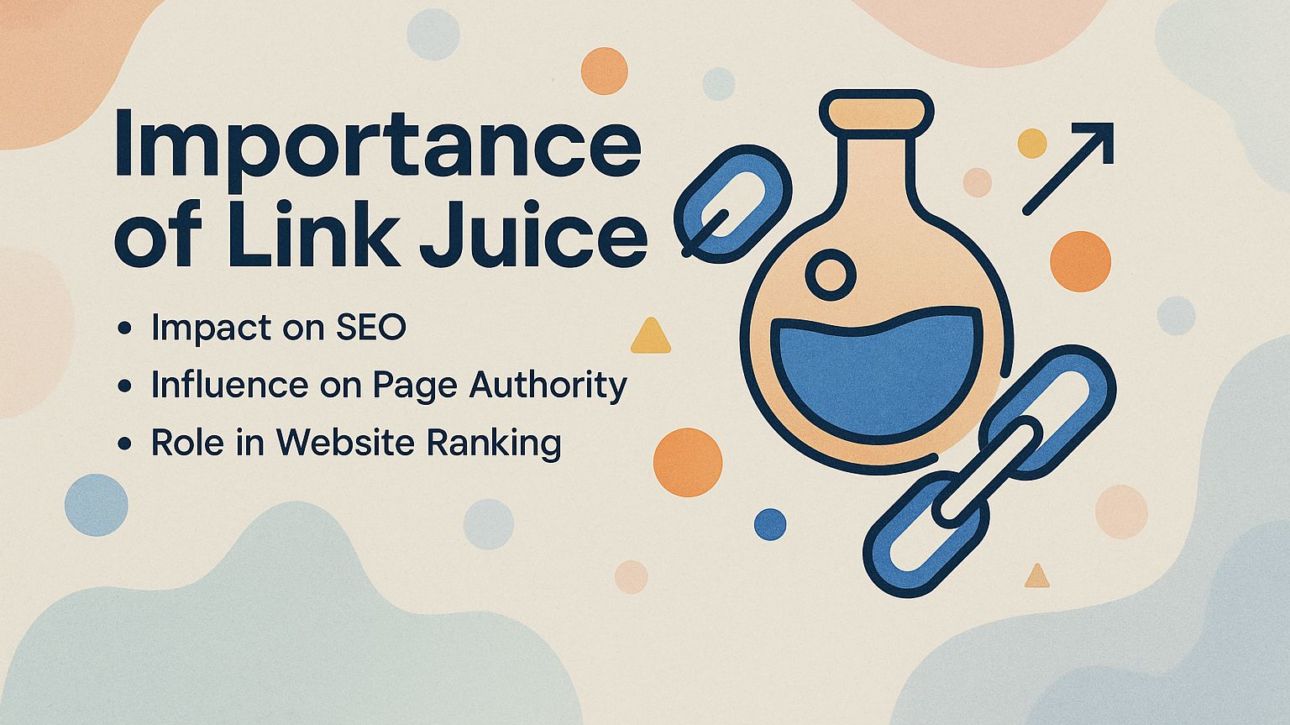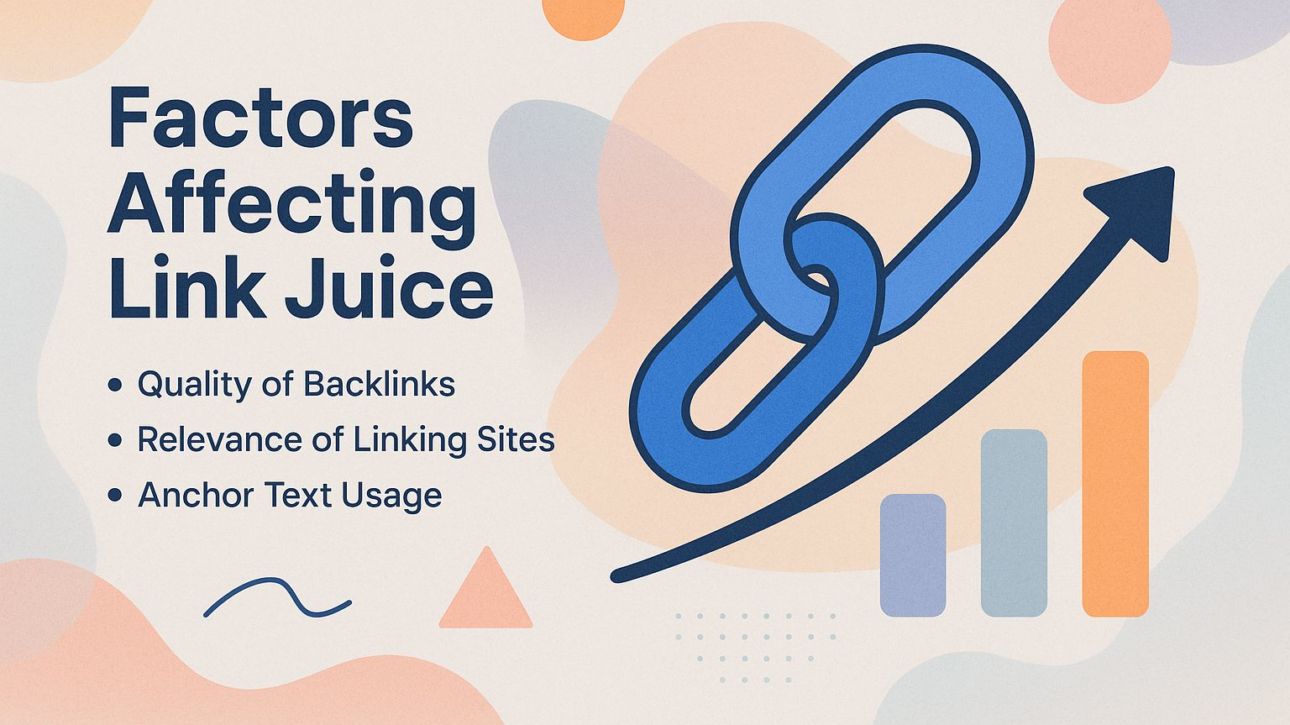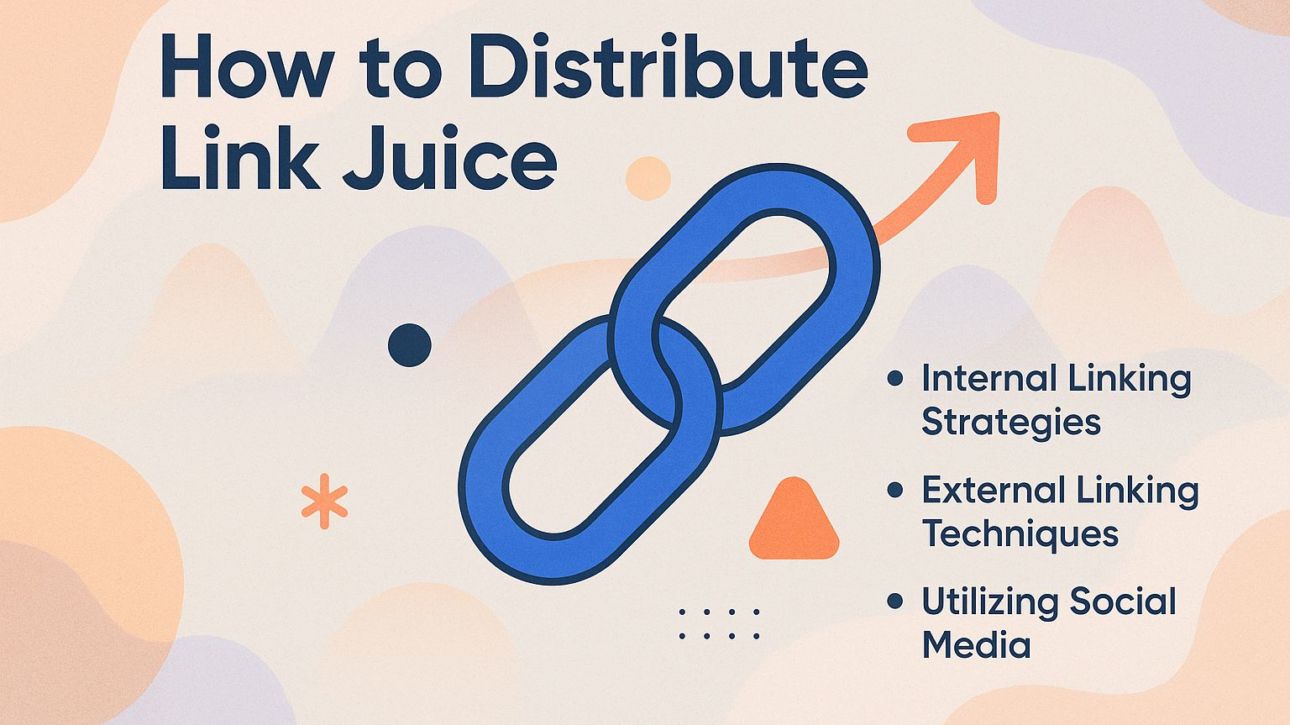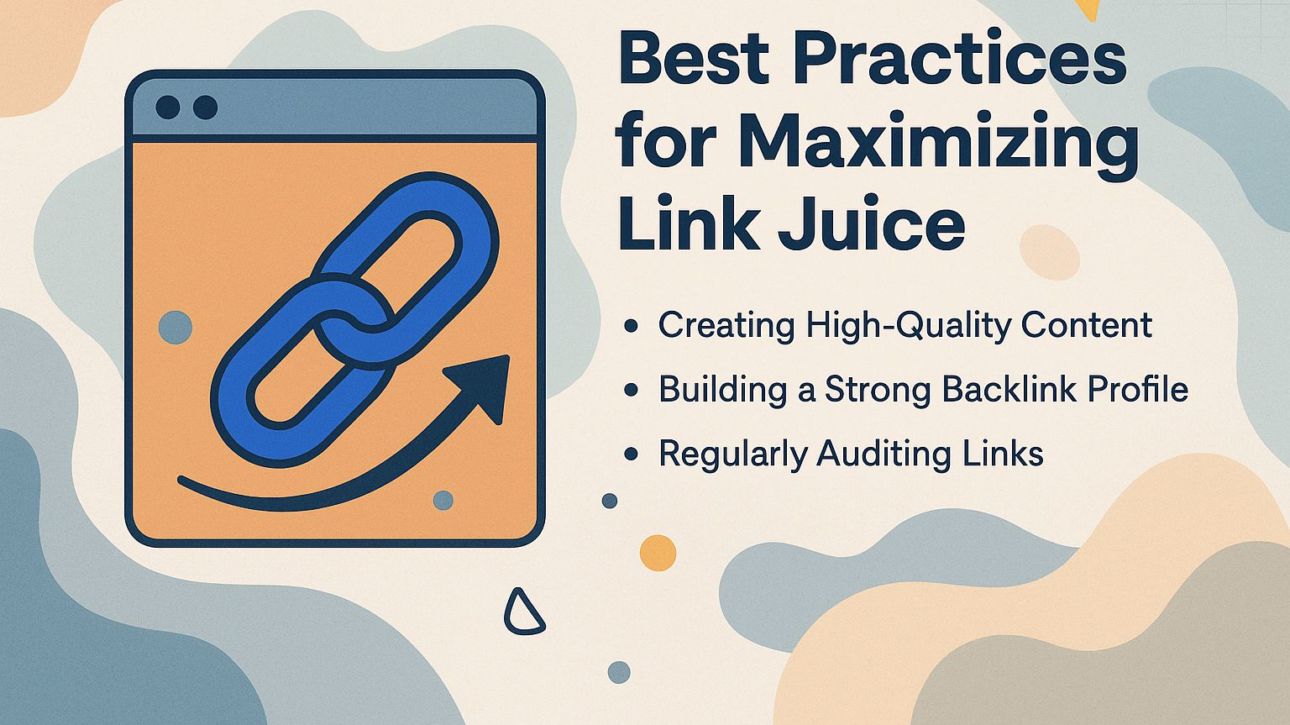Knowing how link juice functions is important for anyone trying to improve their website’s position in search engines like Google. This term describes the power transferred from one webpage to another, affecting the value and influence of links and page strength. In this article, we’ll look at what link juice means, why it matters for SEO, and how to share it effectively. Learn how to use this powerful tool to improve your online presence!
Key Takeaways:
- Link juice is the value or credibility that moves from one website to another through backlinks.
- It is important for boosting a website’s SEO, credibility, and position in search engine results.
- To share link value well, use both internal and external linking techniques, and concentrate on making excellent content while checking backlinks often.
Contents
What is Link Juice?
Link juice is the value passed between web pages through backlinks, which is important for search engine visibility.
1. Definition of Link Juice
Link juice is the term used to describe the SEO value that a website passes to another website through hyperlinks. This value significantly impacts PageRank, which in turn influences a site’s visibility in search engine results.
Dofollow links contribute to link juice, as they pass authority from one page to another, helping the recipient page climb higher in rankings.
Conversely, nofollow links, while not passing SEO value, can still drive traffic and contribute to brand visibility.
For example, a nofollow link on a popular blog can bring in visitors through referrals, even if it doesn’t improve PageRank. Recognizing these differences is essential for creating a successful SEO plan.
2. Origin of the Term
The term ‘link juice’ was popularized by SEO practitioners, drawing from Larry Page and Sergey Brin’s algorithm that measures the value of links using PageRank. This concept relates directly to how a website’s authority and ranking are influenced by the quality of its inbound links.
Each link acts as a vote of confidence, and the more authoritative a linking site is, the more ‘juice’ it passes. For example, a link from a popular site like Wikipedia can greatly increase your site’s trustworthiness.
To improve your link authority, concentrate on producing high-quality content that naturally draws links. Also, think about outreach methods like guest blogging or engaging in related forums to create relationships with other industry websites.
Importance of Link Juice
Link juice is important for SEO because it influences how authoritative a page is and plays a big role in determining a website’s position on search engine results pages.
1. Impact on SEO
Link juice is a primary ranking factor in SEO, as it directly influences how search engines perceive the value of a webpage.
When a site receives a high-quality backlink from a reputable domain, such as a major news outlet or industry authority, its perceived authority increases. For instance, a local business that earns a link from a well-respected national site may see a traffic spike of 30% within weeks.
Tracking tools like Google Analytics can help measure this impact. Tools like Ahrefs or Moz can help evaluate backlink quality by examining metrics like Domain Authority and Trust Flow, which are strongly linked to effective link strength.
2. Influence on Page Authority
Page authority is shaped by link juice, determining a page’s ability to rank in search engine results. Link juice, a term that describes the SEO value passed from one page to another through hyperlinks, significantly impacts page authority. Tools like Ahrefs and Moz can help you analyze this.
For instance, Ahrefs provides a domain rating (DR) score ranging from 0 to 100, indicating overall site strength and link profile quality.
A page with a high DR (say 70+) can pass substantial link juice to linked pages, enhancing their authority. Moz also uses the Page Authority (PA) score, which can go up to 100. To increase your page authority, focus on getting links from websites with strong PA and DR ratings.
3. Role in Website Ranking
Link juice is important for website ranking by spreading authority across web pages, improving SERP performance.
To make the most of link authority, concentrate on methods for linking within your site. You could focus on connecting well-respected pages to recent content, showing search engines that your new pages are important.
An example is how HubSpot improved their rankings by strategically linking blog posts to key pillar pages.
Consider using tools like Ahrefs or Moz to check your link setup and find ways to make your internal links better. Regularly check your links to keep a good balance, which can help improve your site’s authority and visibility.
Factors Affecting Link Juice
Many elements can affect how link authority spreads, which influences search engine optimization plans.
1. Quality of Backlinks
The quality of backlinks significantly determines the amount of link juice passed to your site, with high-authority sites providing more value.
Getting links from respected sites like.edu and.gov makes your site more trusted and improves how it appears in search results.
For instance, guest posting on a reputable university blog can offer a powerful backlink. Consider using tools like Ahrefs or Moz to identify potential sites in your niche with high domain authority.
To increase the likelihood of getting useful backlinks, engage with these sites by leaving comments on their articles or sharing their content.
2. Relevance of Linking Sites
The importance of connecting websites improves the power of link juice, because search engines prefer backlinks that fit the topic.
For example, a health blog would benefit more from backlinks originating from medical news sites or health organizations rather than unrelated domains.
This principle is effectively illustrated by major niche websites like Healthline, which has garnered significant authority and visibility by cultivating backlinks from reputable medical journals and health-related blogs.
Tools such as Ahrefs and Moz can help identify these relevant sites, allowing you to outreach for partnerships or guest blogging opportunities to strengthen your backlink profile and improve your SEO performance.
3. Anchor Text Usage
Using anchor text correctly is important because it helps explain the topic of the linked content, which can improve link value.
To improve your SEO plan, focus on adding relevant keywords to your anchor text while keeping it easy to read naturally. For example, instead of using ‘click here,’ opt for ‘SEO best practices’ when linking to a related article.
Avoid over-optimization by diversifying your anchor text; use variations like synonyms or long-tail keywords. Tools like Moz’s Keyword Explorer can help you find useful words.
Regularly check your internal links to make sure they are still useful and work well, focusing on creating a good experience for users.
4. How to Distribute Link Juice
Properly sharing link value is important for achieving top SEO results and increasing the website’s trustworthiness.
1. Internal Linking Strategies
Good internal linking helps spread the value of links across your site, allowing search engines to easily navigate your site and making it better for users.
To use internal linking well, begin by finding key content that acts as a central point for related subjects.
For example, if you have a cooking blog, a complete guide on ‘Baking Basics’ can link to specific recipes and baking tips.
Use tools like Yoast SEO to see your link structures and make sure you have the right amount of links. A case study of the site ‘ExampleCook.com’ showed a 30% increase in organic traffic by adding strategic internal links.
By emphasizing clear links, you improve SEO and make the reading experience better (our guide on on-page SEO techniques explores this in detail).
2. External Linking Techniques
Using strategic external linking can improve your site’s credibility and help distribute link value. To maximize the impact of external links, focus on high-authority domains-the likes of reputable news outlets or academic journals.
For example, linking to a detailed research paper can support your claims and increase trust. Consider using tools like Moz’s Link Explorer to check your link strategy and identify key external sites.
Add links naturally to your content. For example, if you mention a specific statistic, include a source link for confirmation. This method improves SEO and helps readers interact more with your content.
3. Utilizing Social Media
Social media platforms can be powerful tools for distributing link juice, driving traffic, and enhancing user engagement.
To use social media well, keep your branding the same across all profiles. Make sure images, colors, and messages match your website’s look and feel.
Create engaging, shareable content-such as infographics or short videos-that connects with your audience. Use tools like Buffer or Hootsuite to schedule posts at optimal times, maximizing visibility.
Recent statistics show that businesses that frequently use social media can increase their website traffic by up to 200%. Consistent interaction and well-timed posts help build a loyal following, increasing the likelihood of shares and driving organic traffic to your site.
Best Practices for Maximizing Link Juice
Using the right ways to share link value can significantly improve your site’s reputation and lead to better SEO outcomes.
1. Creating High-Quality Content
Good content is essential for getting backlinks because it gives other sites a reason to link to it. To make this kind of content, concentrate on thorough research and unique ideas.
For example, using data from tools like Google Trends or SEMrush can make your information more trustworthy. Creating detailed guides or case studies that address particular issues makes you seen as an expert and encourages other websites to link back to you for sources.
Studies show that articles above 2,000 words tend to attract more links. Therefore, aim for detailed, well-structured pieces that encourage organic sharing and linking.
2. Building a Strong Backlink Profile
Having good backlinks helps increase site authority and improves SEO. To create a strong backlink profile, make sure to get links from various places.
Begin by finding well-regarded websites in your field where you can write guest posts. Offer useful content that includes links back to your own site.
Check your current backlinks often with tools like Ahrefs or SEMrush to confirm they are still good quality.
Engage in community discussions on forums and social media, linking back to relevant content on your site. This method expands your backlink profile and strengthens your website’s authority.
3. Regularly Auditing Links
Regularly auditing your links is essential for maintaining a healthy link profile and maximizing link juice. To carry out a detailed check of website links, use tools like Moz and SEMrush.
Start by importing your backlink data into these platforms, which will allow you to evaluate various metrics such as domain authority, spam score, and link relevance.
Identify low-quality or toxic links-those from questionable sites or with high spam scores-and consider disavowing them using Google’s Disavow Tool. Monitor link velocity; a sudden spike may indicate unnatural link building, which could harm your site’s credibility.
Common Mistakes to Avoid
Avoiding common mistakes with link juice can keep your SEO strategy effective and improve your site’s performance.
1. Over-Optimizing Anchor Text
Using too much anchor text can weaken the impact of links and result in search engine penalties, hurting your backlink plan.
For instance, sites that repeatedly use exact-match anchor text like “best running shoes” across multiple backlinks may trigger Google’s Penguin algorithm, resulting in significant ranking drops.
To prevent this, use natural anchor text variations like “check these running shoes” or “our top choice in footwear.” A balanced approach to anchor text includes branded, simple, and detailed keywords, creating a more natural link profile.
Regularly audit your backlinks using tools like Ahrefs or SEMrush to identify and resolve any over-optimization issues.
2. Neglecting Internal Links
Neglecting internal links can compromise link juice distribution and negatively impact your site’s overall SEO strategy.
To improve your internal linking strategy, use this checklist:
- Add links within relevant blog posts to connect related content.
- Use descriptive anchor text that reveals the destination’s content.
- Put links directly in the text instead of footnotes or sidebars.
- Regularly audit your existing content and update outdated links.
- Consider using tools like Ahrefs or Screaming Frog to analyze your link structure.
Following these practices improves search engine ranking and makes the user experience better.
3. Recap of Key Points
This article covered the basic points of link juice and how it improves SEO results. To make the most of link juice, concentrate on creating high-quality backlinks. Start by identifying authoritative sites in your niche and reach out for guest posting opportunities.
Tools like Ahrefs and SEMrush can help analyze backlink profiles, guiding you to potential partners. Improve your internal linking by connecting related articles on your site to share authority.
Aim for a natural flow in linking, ensuring relevance and value for readers. Consistent monitoring and adjustment based on performance metrics will maximize your SEO results over time.
4. Future of Link Juice in SEO
The role of link authority in SEO is expected to change with search engine updates, focusing more on the importance and quality of content.
Recent changes to algorithms have put more emphasis on how users interact with websites. This means websites need to load quickly, work well on mobile devices, and be easy to use.
Tools such as Google PageSpeed Insights can identify areas that need better performance. Doing keyword research regularly with tools like Ahrefs or SEMrush helps keep your content aligned with changing search queries.
Creating content that naturally draws backlinks-whether through infographics, expert interviews, or detailed guides-now plays an important part in using link power well. Focusing on quality rather than the number of items will be important for upcoming SEO plans.
Frequently Asked Questions
1. What is Link Juice?
Link juice is the value and influence a website or page gives to another site through a link. It’s a type of online money in the area of search engine optimization (SEO) that helps a website rank higher in search results.
2. What is the Importance of Link Juice?
Link juice is important because it helps improve a website’s search engine ranking, which in turn drives more traffic to the site. It also builds trust and reliability with search engines, increasing the chances for the site to show up in top search results.
3. How is Link Juice Distributed?
Link juice is distributed through backlinks, which are hyperlinks from external websites that point to your website. These backlinks act as votes of confidence and authority for your site, and the more quality backlinks you have, the more link juice you’ll receive.
4. What are Quality Backlinks?
Quality backlinks are links from trustworthy and related websites with strong domain authority, seen as important by search engines. These backlinks have a significant impact on the amount of link juice your website receives and can greatly improve your search engine ranking.
5. How Can I Improve My Link Juice?
To improve your link juice, you can focus on creating quality content that other websites will want to link to. You can also reach out to other websites and offer to guest post or collaborate on content, which can help generate more backlinks and distribute more link juice to your site.
6. What are Some Common Mistakes in Distributing Link Juice?
Some common mistakes in distributing link juice include getting backlinks from low-quality or irrelevant websites, using the same anchor text for all backlinks, and overusing the nofollow attribute. These mistakes can harm your website’s search engine ranking and should be avoided when distributing link juice.



